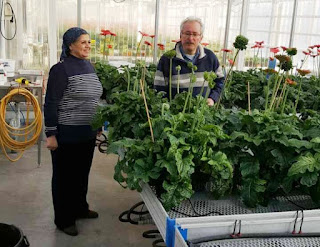Did you know that scientists have designed rice plants that can flower on demand? How about the study on rice enriched with antioxidant resveratrol? These are just some of the interesting news on crop biotech in 2017.
We summarized
the top 10 most trending Crop Biotech Update news shared on Facebook to give
you a glimpse of crop biotech happenings last year. Read on and make sure you
don't miss which news made it to the number one spot.
"Do we really wish to have a science-based society or
should we let ourselves be governed by prejudices and misconceptions?" ask
Roberto Defez, a molecular microbiologist at the Italian National Research
Council, and Dennis Eriksson, a researcher at the Swedish University of
Agricultural Sciences. They asked this question in their article in Euractiv,
which was published after the EU court ruled that prejudices on GM
foods are unfounded.
A science exchange program was held in February 2017 between Cairo University, Egypt
and Helsinki University
in Finland.
Prof. Naglaa Abdallah of Cairo
University and director
of Egyptian Biotechnology Information Center (EBIC) participated in the event.
8. DEVELOPMENT OF CANKER-RESISTANT CITRUS THROUGH CRISPR-CAS9 EDITING OF SUSCEPTIBILITY GENE PROMOTER
Researchers from Chinese Academy
of Agricultural Sciences and National Center
for Citrus Variety Improvement and Southwest
University in China report
the improvement of citrus canker resistance through CRISPR-Cas9. The
researchers performed targeted editing of host disease-susceptibility gene CsLOB1 promoter in citrus, which led to
mutation lines with enhanced resistance to citrus canker compared to wild
types.
Mozambique has planted the first field trial
of genetically modified (GM) maize in the Chokwe District of Gaza Province as
part of the Water Efficient Maize for Africa (WEMA) program. The trial will
test the tolerance of GM maize to drought and insect pests.
Scientists from France
and the U.K.
reviewed 52 articles and found that most of the applications of CRISPR in crops
were to improve the yield performance of the crops, as well as to improve the
nutrient content (biofortification) and the tolerance to abiotic and biotic
stresses.
A group of researchers from ETH Zürich genetically modified rice that
not only has increased levels of the micronutrients iron and zinc in the
grains, but also produces beta-carotene, a precursor of vitamin A. The new
multi-nutrient rice lines are still being tested in the greenhouse and analyzed
for their micronutrient content.
A study conducted by researchers from the National Agri-Food
Biotechnology Institute in India demonstrated
that genome editing through CRISPR-Cas9 can be applied for banana genome
modification.They tested this concept by performing mutation in genes involved
in an enzyme activity. The decrease in chlorophyll contents exhibited by mutant
plants implies that the function of the genes were disrupted.
Dow AgroSciences LLC researchers evaluated the impact of
stacking genetically modified events on maize grain on biochemical
composition and compared it with the impact caused by generating non-GM
hybrids. The composition of GM breeding stacks was found to be more similar to
the composition of their iso-hybrids than to the composition of non-GM hybrids
to their iso-hybrids. Hence, non-GM breeding is more capable of influenced crop
composition than transgenesis or stacking of GM events.
Incheon National University scientists
developed resveratrol-enriched rice with herbicide resistance
(RR) and analyzed the metabolic changes that occurred. Analyses revealed that
there were no significant differences in the biochemical structures of RR
compared with the non-RR plants. The results also showed that herbicide
treatment did not affect the chemical composition of RR.
University of Tokyo researchers developed genetically
engineered rice that does not flower until it comes in contact with a
specific fungicide. The results of the study can lead to the development of
crops that can grow in different climate types and facilitate breeding for
different agronomical characteristics.
Never miss the latest news on
agri-biotechnology in 2018. Get FREE Crop Biotech Update subscription now! Go to www.isaaa.org/subscribe.
Written by Kristine Grace N. Tome, Program Associate at ISAAA.
Written by Kristine Grace N. Tome, Program Associate at ISAAA.










No comments:
Post a Comment